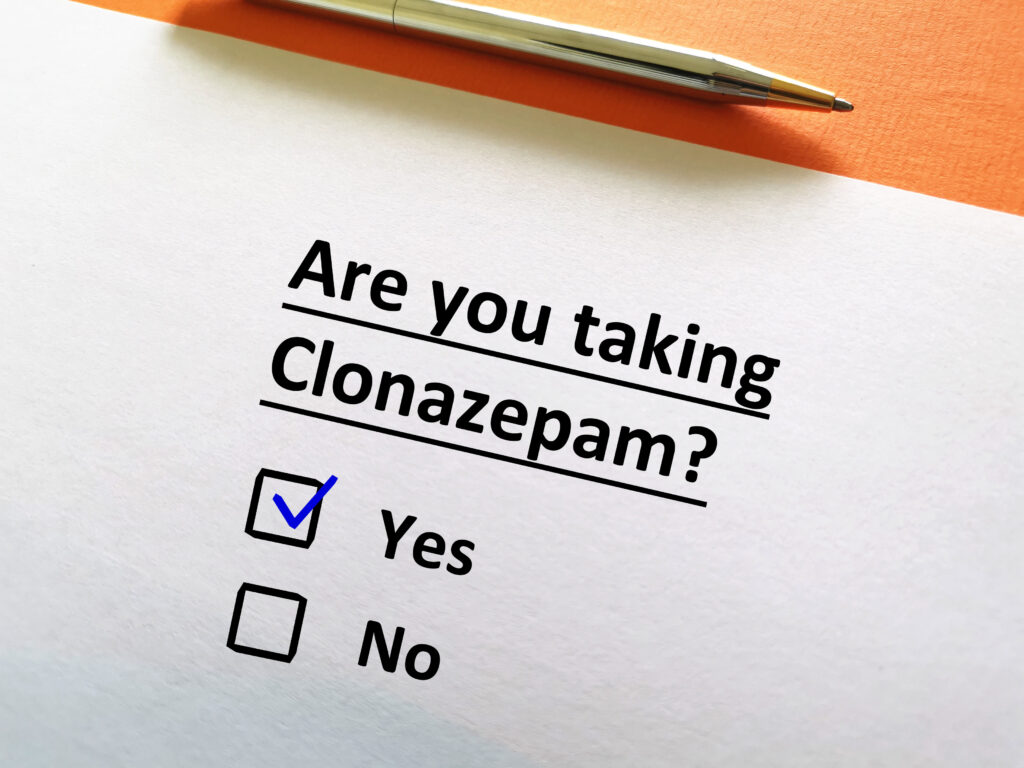What is Clonazepam?
Clonazepam is a prescription medication that is a drug classifications of benzodiazepine. Clonazepam, also known as klonopin, is commonly prescribed to treat generalized anxiety disorder, social anxiety disorder, panic attacks, phobia treatment, and, in some cases, used for seizures and spasticity disorders. Klonopin clonazepam is the third highest prescribed benzodiazepine within the United States. Klonopin clonazepam is prescribed in an oral tablet format with varying dosage amounts depending on what you are using it for.

Clonazepam Effects
Klonopin clonazepam supports individuals who are experiencing negative or debilitating side effects of panic attacks from a panic disorder, anxiety, and other mood disorders by providing a calming, sedative effect that helps to regulate your brain functioning from any overexcitement or overstimulation.
Taking klonopin, a benzodiazepine, will have a depressant effect on your body. A klonopin dose and klonopin abuse may cause the body to have slowed mental and physical processes.
Signs of Clonazepam Abuse and Addiction
Taking klonopin as prescribed by your doctor does not pose a significant risk to your overall health and well-being. However, if you increase your klonopin dose and begin to engage in klonopin abuse, there is an increased risk of developing a substance abuse disorder. Addiction affects each person differently and there will be different signs and indicators for each person experiencing klonopin addiction and abuse. Some common signs of klonopin addiction and abuse are:
- Taking Klonopin in larger doses or taking it for a longer period of time than originally discussed with your doctor.
- Expressing the desire to stop taking Klonopin but experience failed attempts at doing so
- Taking a substantial amount of time, resources, and energy to get Klonopin, use it, and recover from klonopin abuse
- Having a strong desire or cravings to use Klonopin
- Inability to perform daily responsibilities such as work, school, or family due to klonopin abuse
- Continue taking klonopin even after experiencing negative consequences
- Loss of interest in activities that you once enjoyed to engage in Klonopin abuse
- Taking klonopin in high risk situations
- Even though the Klonopin abuse is worsening physical, psychological, or social aspects of life, continuing to use it
- Developing a tolerance to Klonopin where you need to use more to reach the same desired high
- Withdrawal symptoms when the klonopin dose lessens
Clonazepam Withdrawal Symptoms
If you are living with a klonopin clonazepam addiction, you have undoubtedly thought about stopping your klonopin abuse but there are thoughts or concerns about the potential klonopin withdrawal symptoms. Depending on the severity of your klonopin abuse including how long you have been engaging in substance abuse and the amount in which you use, your klonopin withdrawal symptoms will vary. Common withdrawal symptoms that a klonopin addict will experience in klonopin detox are:
- Gastrointestinal functioning disturbances
- Excessive sweating.
- Tingling or numbness.
- Dizziness or lightheadedness
- Memory loss
- Hallucinations.
- Sensitivity to light or sound.
- Rapid, increased heart rate
- Heart palpitations.
- Onset of Anxiety.
- Panic attacks
- Mood swings
- Seizures
Long Term Side Effects of Clonazepam Abuse
Engaging in klonopin abuse over an extended period of time increases the risk of developing long term side effects that can impact your physical and mental health. In order to treat the long term effects and safely overcome your klonopin addiction, it is important you seek help from treatment centers. Klonopin addicts may experience the following long term side effects of klonopin abuse:
- Loss of memory
- Slowed, shallow breathing
- Increased risk for dementia
- Decreased language and motor skills
- Coma
- Death
Individuals are at greater risk if you mix clonazepam with opioid addiction or alcohol addiction as both substances are central nervous system depressants. This means that you will experience an increased sedation rate which will lower your breathing rate and potentially cause respiratory depression and in some cases, loss of life.
Clonazepam Addiction Treatment
At Novo Detox, our compassionate and highly qualified medical team and addiction counselors will support you in safely detoxing from klonopin and addressing the root causes of your substance abuse with the support of evidence based therapy methods. Your klonopin clonazepam addiction began as a method to treat an ongoing co occurring disorder and developed into a klonopin addiction and abuse over time. With the support of behavioral therapy, medical detox, and dual diagnosis treatment, you will be able to safely move through your klonopin withdrawal symptoms and begin to develop the tools and skills to manage your co-occurring disorders with a natural, holistic treatment process.
Contact our treatment facility today to hear more about the in depth, personalized approach to addiction recovery and start your road to recovery today.




